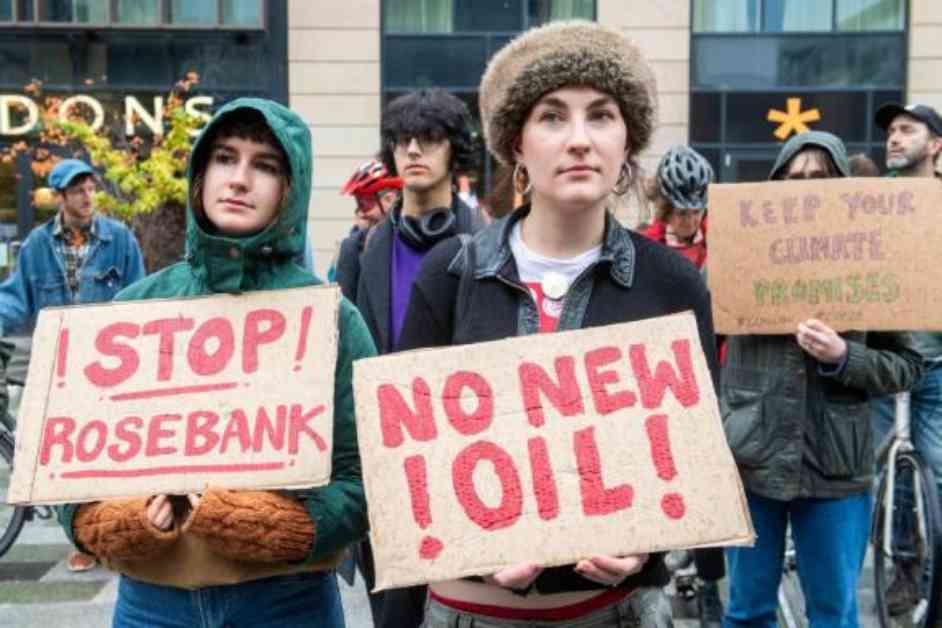The Court of Session in Edinburgh has given the green light to two legal challenges against the approval of the new Rosebank oil and gas field in the North Sea. Despite objections from environmental groups, permission has been granted to drill in the untapped field off Shetland, sparking controversy and legal battles.
Legal Challenges and Background
Uplift and Greenpeace UK have both applied for judicial reviews of the decisions made by the energy secretary under the Conservative government and the North Sea Transition Authority (NSTA) to grant consent to the Rosebank project last year. The UK government announced in August that it would not contest the legal challenge, leaving Norwegian state-owned oil giant Equinor and UK-based Ithaca Energy to defend the field as its owners.
The Supreme Court issued a ruling in June stating that the climate impact of burning coal, oil, and gas must be considered when approving fossil fuel projects. If Uplift and Greenpeace succeed in their challenge, the owners will have to resubmit environmental assessments, and the project may only proceed if a new license consistent with the law is issued by the UK government.
Uplift’s Case
The Court of Session has agreed to hear Uplift’s case for a judicial review on all grounds argued. Uplift’s application challenges the UK government’s failure to consider the downstream emissions from burning Rosebank’s oil and gas, which contribute to climate change. The application argues that the Energy Secretary’s consent was based on an Environmental Impact Assessment (EIA) by Equinor that excluded downstream emissions, which it deems irrational.
Moreover, Uplift contends that approval of Rosebank conflicts with the UK’s legal commitment to achieving net zero emissions by 2050. The organization also alleges breaches of the Marine and Coastal Access Act 2009 and claims that the NSTA’s approval of the project was procedurally unfair and irrational due to the lack of reasons provided for its consent.
Tessa Khan, climate lawyer and executive director of Uplift, emphasized the detrimental impacts of the Rosebank project on Britain, highlighting the economic and environmental risks associated with it. She stated that the project would not lower energy bills or enhance energy security, as most of the extracted oil would be exported, with significant costs being borne by the UK public.
Environmental Impact and Concerns
Campaigners have raised concerns about the substantial carbon emissions expected from the Rosebank project, with estimates suggesting it could emit more CO² than the combined emissions of the world’s 28 lowest-income countries in a year. Critics argue that the project’s contribution to climate change outweighs any potential benefits, particularly as the majority of the oil and gas produced would be exported rather than benefitting the UK.
The UK Government’s admission that around 80% of the oil produced in the country is refined overseas raises questions about the project’s impact on domestic energy supply and consumption. Equinor’s assertion that the energy will ultimately end up in the UK grid does little to assuage concerns about the project’s environmental footprint and long-term sustainability.
Public Opinion and Industry Response
Public opinion on the Rosebank project remains divided, with some advocating for its development to boost economic growth and energy security, while others emphasize the need to prioritize climate action and renewable energy sources. The oil and gas industry’s stance on the project reflects its interests in maintaining profitability and securing investments in fossil fuel extraction.
Equinor’s Role and Future Implications
Equinor’s involvement in the Rosebank project as a major player in the oil and gas sector underscores the challenges and complexities of transitioning to a more sustainable energy future. The outcome of the legal challenges against the project will have significant implications for the industry, government policies, and climate action efforts.
Conclusion
The legal challenges against the approval of the Rosebank oil and gas field highlight the growing tensions between fossil fuel development and climate change mitigation efforts. As the courts prepare to hear the cases brought by Uplift and Greenpeace UK, the future of the project and its impact on the environment, economy, and society remain uncertain. The outcome of these legal battles will shape the trajectory of the oil and gas industry in the UK and influence global efforts to combat climate change.
































